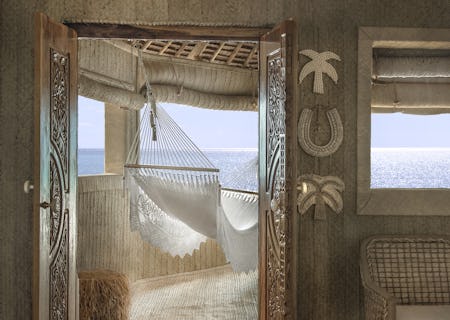


Fanjove Island lies 140km south of Dar es Salaam, in the Indian Ocean's Songo Songo Archipelago. A tropical paradise with the kind of bleached sand you dream of burying your toes in, the island is half a mile long and just a couple of hundred meters wide, surrounded by coral reef and turquoise waters. There's lots to see and do, when you're not chilling to the max. Getting here is half the fun: take a 20 minute flight in a small plane to Songo Songo Island, then ride a dhow (traditional Tanzanian fishing boat) or a speedboat for 5 miles to Fanjove. The lodge itself is simple; it's luxury is in its tranquility and exclusivity as a remote, private island hideaway.




/39.56650886027017,-8.572785275570187,3/600x400?access_token=pk.eyJ1IjoidGltYnVrdHV0cmF2ZWwiLCJhIjoiY2poMGw1eHpkMmRkbDJ6bW8xYWZ5OGpjYyJ9.PYvAO7lUJ40SOpGvwmQLqw&attribution=false&logo=false)
Fanjove's owners have resisted the temptation to build something too polished and extravagant, and have instead kept the main area remarkably simple. It is made completely out of wood and thatch, and almost entirely solar-powered. An open-sided lounge has a beach sand floor and a little bar at the back (drinks at extra cost), as well as a few sun-loungers under rustic, thatched shades on the beach. The dining room is on a slightly raised wooden deck just 20 metres from the water's edge. Deliciously fresh seafood is served, often with a spicy Arabic or simple Italian flavour.
Six A-frame, eco bandas (thatched huts), quaintly resembling dhow sails, are dotted along the beach. Each has an ocean view, and there's so much space between them you'd think you had the entire island to yourself! (well of course, that's the point). The downstairs bedroom is furnished simply, with little besides the four poster bed (plus mosquito net), two cushioned armchairs, and huge double-doors that open up right onto the beach. The ensuite bathroom is at the back, with a hot shower, open to the stars. The bandas are powered exclusively by solar power. Upstairs, a lounge leads onto a private balcony with the views you've been dreaming of. Hats, beach bags and coconut oil (for sun overdose!) are provided.
When you're not reclining on the soft sand or flopping about in the warm ocean, take a walk around the island to explore the coral cliffs, the lighthouse, and the lagoon at the center. Birders are in for a treat as thousands of migratory birds (crab plovers, whimbrels and turnstones) stop off between November and March, while weavers, egrets and herons are resident year-round. Green turtles nest on the beach from January to April, and humpback whales visit from July to October. Spinner and bottle-nose dolphins are resident, along with many species of tropical fish, and the reef offers really good snorkelling and diving opportunities (although adverse weather limits diving between June and October). Dive tanks cost about $50; other equipment is free (unless you require a guide and/or a boat). Kayaks are also available, free of charge. Or, at extra cost, you could take a trip back in time to the community school, mosque and market on Songo Songo Island. The lodge is open seasonally, from June through March.

The Time + Tide Foundation is dedicated to preserving natural environments and supporting nearby communities, and guests contribute to sustainability purely by visiting their hotels. The foundation focuses on community and school-based learning, female empowerment, health, and wildlife conservation. Through initiatives like student sponsorship, it aims to ensure the long-term prosperity of wildlife economies and foster positive social change in Time + Tide communities.
A contribution of $10 per guest, which is included in the nightly rate, goes towards the above goals.
Start with a recommended trip or create one from scratch

A barefoot beach break with some of the world’s best diving and a good selection of eco-chic lodges.